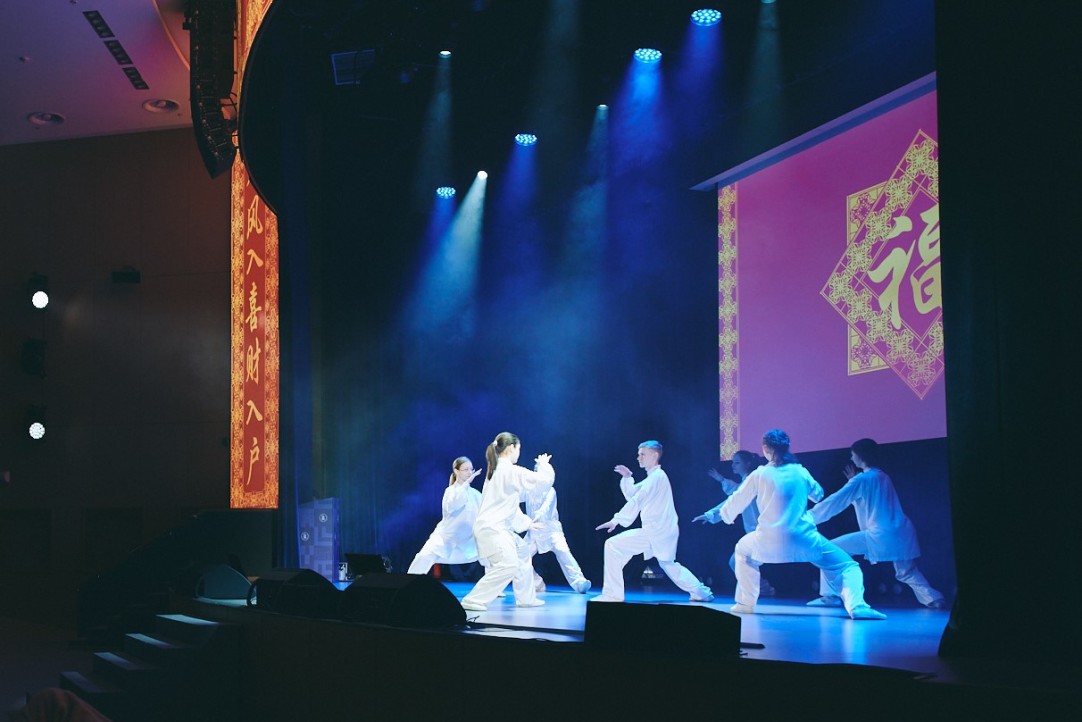Wushu, Tekken and Fortune-telling by the Book of Changes: Lunar New Year Celebrated at HSE University

This New Year, according to the Asian calendar, arrived on January 22nd. On this day, HSE Cultural Centre brought together Chinese, Korean, and Japanese cultures. To the sounds of Asian songs and Korean drums, the guests tried their hand at calligraphy, studied jianzhi and origami, played Ttakji and Go, ate traditional cookies and expelled evil spirits. The Lunar New Year at the university was organized by the School of Asian Studies and the HSE Chinese Club.
A Holiday for Everyone
‘It’s important to me that the Lunar New Year is inclusive,’ says Anastasia Likhacheva, Dean of HSE Faculty of World Economy and International Affairs. ‘Those not engaged in Asian studies still have every chance to enjoy it.’
Many guests and organizers of the holiday dressed up in elegant Asian costumes: you could see wide fabric kimono belts, flared hanfu sleeves and elegant qipao dresses. Traditional instruments sounded, and bright photo zones with symbols of this Lunar Year – rabbits,cooking fish soup in cauldrons attracted attention. This is a reference to another Chinese tradition: in Chinese, the word ‘fish’ is pronounced as ‘yu’, as well as the word ‘well-being’, so the preparation of this food symbolizes wealth and prosperity over the coming year.

Anastasia Likhacheva
‘We face a very serious problem: our love for Asian studies is starting to exceed our space and capacities, so I ask my colleagues to seriously think about venue expansion and use larger-scale sites for the next holiday so a greater number of guests can feel part of the Asian world,’ suggests Anastasia Likhacheva.
From Origami to the Book of Changes
Students from the Moscow Experimental School of Moskomsport came to HSE University to conduct master classes; teaching basic wushu techniques to guests and preparing performances for the festive concert.
HSE Chinese Club also worked on the interactive part of the festival. Club participants organized workshops on jianzhi and origami paper cutting, and offered guests fortune cookies. Fedor Dolgachev, teacher at HSE School of Asian Studies, taught everyone the basics of calligraphy.
HSE Go Club organized competitions in the logical board game ‘Go’. Its rules have hardly changed in more than two thousand years of history: two players, using black and white stones, must occupy most of the territory on the board.
One of the most popular Chinese activities was fortune-telling using the Book of Changes (I Ching). A lot of people lined up to find out what awaited them in 2023. The process was as follows: you formulate a request (a problem or an urgent question), then flip a coin six times — and the book gives a solution. One of the most popular answers was the perennial advice to look for a balance between rest and work.
From Japanese to Korean Studies
Guests were also able to try their hand at quizzes in Japan and Korea. One of the tasks for experts was to collect Korean proverbs. The best of the best in solving these tricky problems received prizes.
Those wanting to have a different sort of fun played the traditional South Korean game Ttakji, which requires a lot of skill, because it's not so easy to throw a paper square on the table so that the other one already lying there flips over.
Fans of computer games played Tekken (a popular series of computer games created by Namco, the gameplay simulates fighting and hand-to-hand combat). In this game you can be anyone — a supernatural character or an animal. The Tekken franchise already includes three films and a manga.

Andrey Karneev
‘On the one hand, I hope that the new year, the year of the Rabbit and the Hare, brings a new harvest of knowledge, competencies, skills, friends, success in studies, but, on the other hand, may it also expel evil spirits, and therefore let's hope that we can expel the spirits of laziness and lack of concentration, and make our successes more impressive,’ said Andrey Karneev, Head of HSE School of Asian Studies.
Beautiful words in Asian languages, a lottery with prizes, including merch with HSE logo, a concert with the participation of the cover band Just Dance, brilliant performances in Asian style, singing songs and reading poetry, playing Korean samulnori percussion - the organizers of the Lunar New Year managed to surprise every guest.
Kabuki theatre, a well-known variety of Japanese theatrical art, was the culmination of the festival. In past centuries, such performances helped commoners express their opinions about politics. Students prepared the play ‘The Three Cripples’ ( 三人片輪), showing a story about a landlord who decided to hire people who were blind, lame and mute to guard the basement, the wardrobe with clothes and the treasury. However, all three employees only pretended to be crippled: when the owner was away for a while, the servants decided to drain the sake jugs, and then rob the master. But the idea failed: while they were drinking and scattering beans to exorcise demons in honour of the Japanese holiday setsubun, repeating ‘demons out, happiness in the house,’ the owner returned. He found out about the servants’ fraud, but in honor of the great day, forgave them.
‘When we started preparing this holiday, we didn’t even think that it would cause such interest,’ says Alexandra Dudina, one of the organisers, 3rd-year student of the programme in Asian and African Studies at the Faculty of World Economy and International Affairs. ‘I was sitting in the hall and during the concert several times I almost shed a tear. It was so amazing! I hope these emotions have reached each of you.’
Text: Luisa Amelina, Research Assistant in the Economic Journalism Project Learning Laboratory

